#Queer reading
Text
One thing I love about Steven Universe is that for gems, all attraction and romance is queer attraction and romance. In gem culture there is no culturally normative model to experience, it's all taboo.
49 notes
·
View notes
Text
My thoughts on LGBTQ and LOTR.
So here's the thing -- Tolkien was a devout Catholic. He also lived in the early/mid 20th century, and was a man of his time. As such, it is highly unlikely that he intended for Sam and Frodo, or indeed anyone else in LOTR to be LBGTQ.
BUT, it is also important to remember that it does not matter what he actually intended. The thing about literature, or art in general, is that in the reading and in the experiencing, it comes to transcend the author's original intentions and takes on an independent life of its own.
280 notes
·
View notes
Text
I'm not saying this is canon or anything, obviously it's hard to apply modern conceptions to older writings and we all bring ourselves to our interpretations. That said, there's something really special to me as a queer woman-adjacent person about how Mina loves Lucy and Johnathan. I still think about the scene where Mina watched Lucy sleep and thought about how beautiful she was, how her fiancé will be lucky to see her like this. She segways into thinking about how women in the future will be able to propose to their husbands-to-be. I think Mina has the same love in her voice when looking after Lucy and when looking after Johnathan. And of course finding someone beautiful doesn't have to be romantic. I just like reading Mina as bi/queer and drawing on scenes like these.
#slimeposts#re: dracula#dracula daily#mina murray#or#mina harker#! <3 good for her <3#queer reading#idk how to tag#i just think mina has a lot of love to give and she should be allowed to kiss lucy if she wants to
513 notes
·
View notes
Text
For those of us who are looking to read more queer this 2024, I have a couple of resources that might help! First, our affiliate list on Bookshop.org; for the fans of reading books. Second, our article list; for those article readers who might be a fan (or want to become a fan of) queer history!
#queer history#queer#lgbt#lgbt history#gay history#lesbian history#transgender history#transgender#making queer history#queer books#queer reading#lgbt reading#lgbt books
133 notes
·
View notes
Text
I’m fully aware that most of the casual HSR playerbase have not played or even experienced Honkai Impact 3rd. However, given the existing precedent for queer subtext and relationships in Hi3rd as well as how Hoyo goes about it under CCP censorship laws, what we know about Robin’s character (lesbian colours, song reference to Emily Dickinson, flirting with March 7th, etc.) appears to be one of the more blatant instances of queer subtext by the creators.
All I’m saying is that I’m prepared for chuds and non-believers to be put in their place yet again when Robin officially drops. It’s really the Elysia drama all over again, and if you know, you know.
#anywho I wish all hsr players a happy post lesbian visibility week#praise be lesbian Jesus Elysia#praise be lesbian queen Robin#honkai star rail#hsr#honkai impact 3rd#hi3rd#elysia#robin#queer coding#queer subtext#queer reading#hoyoverse
42 notes
·
View notes
Text
the quote:
"I seek not gaiety nor mirth, not the bright voluptuousness of much sunshine and sparkling waters which please the young and gay. I am no longer young; and my heart, through weary years of mourning over the dead, is not attuned to mirth."
my analysis: so dracula isn't young, but he is gay
#dracula daily#may 7th#dracula#vampires#queer fiction#queer reading#queer analysis#gay#duh#literature#gothic literature#fangs lace and youre gonna tell me it isn't queer????
45 notes
·
View notes
Text
youtube
Just watched a video on Jojo and queer interpretations and I totes recommend it.
Even if you don't know anything about Jojo, it does a good job of explaining why the LGBT community may interpret things in media as queer when it may or may not be intended
78 notes
·
View notes
Text
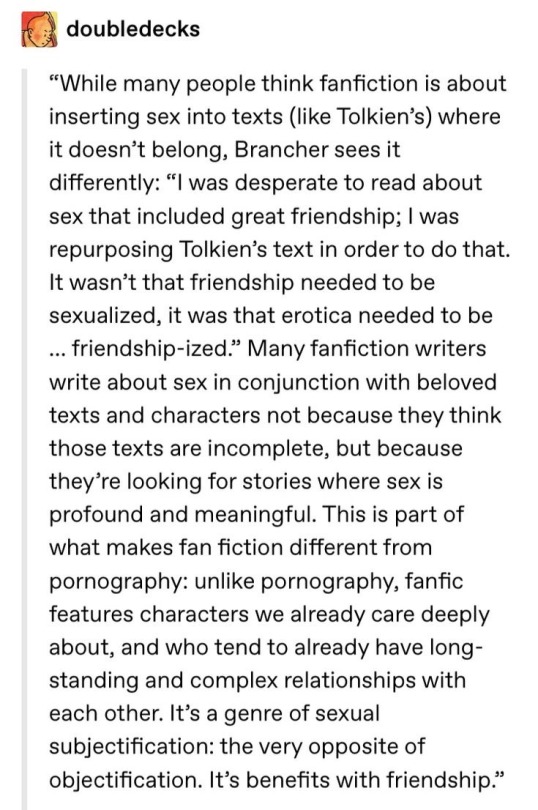
[ID: Screenshot of a tumblr post from @doubledecks with a quote from an unknown source, which reads:
"While many people think fanfiction is about inserting sex into texts (like Tolkien's) where it doesn't belong, Brancher sees it differently: "I was desperate to read about sex that included great friendship; I was repurposing Tolkien's text in order to do that. It wasn't that friendship needed to be sexualized, it was that erotica needed to be ... friendship-ized." Many fanfiction writers write about sex in conjunction with beloved texts and characters not because they think those texts are incomplete, but because they're looking for stories where sex is profound and meaningful. This is part of what makes fan fiction different from pornography: unlike pornography, fanfic features characters we already care deeply about, and who tend to already have longstanding and complex relationships with each other. It's a genre of sexual subjectification: the very opposite of objectification. It's benefits with friendship." End ID]
does anybody know where this quote is from? i found it in my camera roll and i think its an absolutely brilliant way of looking at queer readings of sam/frodo as well as slash fiction in general. i think its from an essay or article or something and i want to read the whole thing. if anyone knows where its from pls lmk!
edit: it’s been found! it’s from “The Fanfiction Reader: Folk Tales for the Digital Age” by Francesca Coppa!
#lord of the rings#samfro#sam/frodo#samwise gamgee#frodo baggins#slash fanfiction#queer reading#the lord of the rings#ao3#fanfiction#fanfic#fan studies#.txt#alex talks
68 notes
·
View notes
Text
ok I am once again having Thoughts on Nimona:
This has been said before but Nimona and Gloreth's backstory is so incredibly heartbreaking especially because it never occurred to Gloreth to treat Nimona differently because she's a shapeshifter, she just thought it was really cool and they kept being friends. BECAUSE THATS HOW KIDS ARE!!! Yes kids can be incredibly cruel sometimes (I got bullied a lot, I know) but they generally don't care about what's "normal" or not. Prejudice because of specific differences is taught. It's not something that people would naturally do and maybe that's the reason this movie hit me so hard right now because there's all these people demonising queer people lately and I've been do frustrated with people saying that having idk, two dad's in a kid's book will confuse the children...
Nimona isnt just a queer story because there's canon representation but because of the THEMES. Nimona and Gloreth just gave me the vibes of children who behave outside of heteronormativity and get told that they're not supposed to do that and then internalise all that hater and direct it at people who refuse to fit themselves into a box...
Also the fact that Nimona was just defending herself again a mob of people and was made out to be the monster???? What the fuck man....
#i know this might be reading a lot into it#but i like analysing media and it gave me The Feels#so leave me alone#i could have probably phrased that all better but I'm very tired now I hope my point comes across the way i intended#nimona analysis#nimona movie#queer reading#media analysis#nimona#nd stevenson#my post
70 notes
·
View notes
Text
There's lots of gay subtext in Ace Attorney.
But when looking specifically at subtext that might be intentionally put in the narrative by the creators with the intention that the character in question is actually gay, I think the main character with the most evidence behind this is actually Apollo Justice.
Our other main characters, Phoenix Wright and Athena Cykes both have obvious subtextually heteronormative romantic partners. To an adult, straight, culturally normative audience, Phoenix Wright and Maya Fey read normatively as an obvious romantic pairing. This is also the case for Athena Cykes and Simon Blackquill. In Great Ace Attorney the same can be said for Ryuunosuke and Susato.
I repeat– to an adult, straight culturally normative audience, the romantic subtext between these characters is clear. If you showed these games to an American movie going public, that would be the obvious read by the audience.
Yes, each of these characters, Phoenix, Athena, and Ryuunosuke also have strong queer romantic subtext with another character. (Miles, Juniper, and Kazuma respectively).
However, that's not my point. It's not significant that each of the other three characters has homosexual relationship subtext.
It is significant that Apollo Justice does not have a character with whom he has heteronormative romantic subtext.
The closest thing Apollo Justice has to a "heteronormative romantic subtext" is Trucy Wright– whom we, the audience know is his sister.
And yes, you can make the argument that there is deliberate incestuous subtext between them– a kind of Luke/Leia style relationship with which the audience is teased by the narrative. Dhurke brings it up directly in Spirit of Justice.
However, this is still not a heterenormative subtext, because of its taboo nature. More taboo, culturally at this point, than homosexuality.
On top of the lack of heteronormative romantic subtext, Apollo also is on the receiving end some of the strongest and most overt of the homosexual subtext in the series.
There is of course the famous "meet cute" introduction between Apollo and Klavier–
“I must say, I'm used to being inspected by the ladies... but this is the first time I've felt this way with another man.”
This is without question overt homosexual subtext.
However, there is another, even more subtextually clearly defined moment in Dual Destinies. Honestly, the subtext is all over Dual Destinies in the way Apollo reacts to Clay Terran's death (basically completely losing it) but there's one particular moment that deliberately draws your attention to the relationship in a queer way.
In one of the last cases of the game, everyone is delicately trying to explain to the judge that Aura Blackquill was in love with Metis Cykes (who was murdered) in a queer way. It's a big “they’re lesbians, harold” moment.
And then the conversation immediately turns to Apollo Justice and how he’s just had someone who was “important to him” murdered, too.
The narrative specifically draws you attention to the relationship that Aura and Metis had, and compares it to the relationship between Apollo and Clay.
You are specifically invited to speculate about what kind of important relationship Clay and Apollo had, and why Apollo has been affected so incredibly deeply.
So yeah. Between Clay, Klavier, and the lack of anything resembling a heteronormative romantic relationship for Apollo in the games, I think he has the strongest narrative evidence that he's actually being written deliberately as gay.
#apollo justice#klapollo#claypollo#ace attorney#ace attorney meta#queer subtext#queer reading#queer media#media analysis#media literacy#🔍⚔️
228 notes
·
View notes
Text
How To Be Gay, by David M. Halperin
While there are obvious fan studies classics, there are other books that don’t always fall into the “fan studies” canon that I have found incredibly useful for my own thinking. I cited one of them, Carol Dyhouse’s Heartthrobs: A History of Women and Desire (2017), a few posts ago; another is David Halperin’s How To Be Gay (2012)
How To Be Gay came out of a course Halperin taught at the University of Michigan, whose full title was “How to Be Gay: Male Homosexuality and Initiation.” The initiation in question was not sexual, but cultural: Halperin believes that there are not only gay texts, a gay canon of sorts, but also gay ways of reading that are taught and learned and that help constitute something we might call a gay subjectivity (that you don’t have to be gay actually to have): e.g. Hollywood movies, opera, Broadway musicals, camp, diva worship, drag, muscle culture, style, fashion, interior design. Halperin asked both why this set of things–why musicals? why this diva or that–and what do they tell us about gay experience? Halperin was trying to trace “gay men’s characteristic relation to mainstream culture,” which often involves collaborative and camp appropriation: a queering.
I find this book very useful, both because fandom also has its own shared languages and rites of initiation (consider the idea of watching something with fannish goggles or slash goggles or a fanfic lens, as was recently discussed in a previous post; think about all the languages and tropes and artistic structures we all learn from each other) but also because Halperin talks about modes of identification that aren’t representational or based obviously in identity politics. So, for example, he says that the gay male students in his class were more likely to express themselves vis a vis a shared text like The Golden Girls than vis a vis the traditions of what Halperin calls “good gay writing.” There is, Halperin argues, a queer pleasure in the Broadway musical that’s different than the pleasures of gay identity or even gay sex; similarly, queer female fans might find pleasures in identifying with, say, Sherlock, Crowley, or Blackbeard that are very different from the pleasures offered by a woman- or lesbian-centered text.
Here’s an excerpt that gives a good sense of the book, I think: fans might identify with this or recognize it as descriptive of their own fannish feels. (FWIW, the italics are all his!)
[H]omosexuality is not just a sexual orientation but a cultural orientation, a dedicated commitment to certain social or aesthetic values, an entire way of being.
That distinctively gay way of being, moreover, appears to be rooted in a particular queer way of feeling. And that queer way of feeling—that queer subjectivity—expresses itself through a peculiar, dissident way of relating to cultural objects (movies, songs, clothes, books, works of art) and cultural forms in general (art and architecture, opera and musical theater, pop and disco, style and fashion, emotion and language). As a cultural practice, male homosexuality involves a characteristic way of receiving, reinterpreting, and reusing mainstream culture, of decoding and recoding the heterosexual or heteronormative meanings already encoded in that culture, so that they come to function as vehicles of gay or queer meaning. It consists, as the critic John Clum says, in “a shared alternative reading of mainstream culture.”
As a result, certain figures who are already prominent in the mass media become gay icons: they get taken up by gay men with a peculiar intensity that differs from their wider reception in the straight world. (That practice is so marked, and so widely acknowledged, that the National Portrait Gallery in London could organize an entire exhibition around the theme of Gay Icons in 2009.) And certain cultural forms, such as Broadway musicals or Hollywood melodramas, are similarly invested with a particular power and significance, attracting a disproportionate number of gay male fans.
What this implies is that it is not enough for a man to be homosexual in order to be gay. Same-sex desire alone does not equal gayness. In order to be gay, a man has to learn to relate to the world around him in a distinctive way. (p. 12 - 13)
–Francesca Coppa, Fanhackers volunteer
65 notes
·
View notes
Text
a (non-conclusive) list of things about queer readings of shakespeare that im obsessed with:
- men who love going to war more than they love their wives (coriolanus, hotspur, brutus etc)
- whatever tf is going on with ”made a divorce betwixt his queen and him/broke the possession of a royal bed” ????????
- whatever tf is going on with just like. the entirety of twelfth night.
- especially whatever is going on with antonio (twelfth night). WHY is he even there if not to just be in love with sebastian?????
- brutus calling caesar his ”best lover” (i KNOW the word ”love” was used much more liberally back then but just the fact that he then proceeds to not show is WIFE any affection whatsoever is hilarious)
- ”but that i see thee here, thou noble thing” girl
- men who treat the concept of their guy-friends growing up and getting married to women as the literal end of the world (ferdinand, benedick, mercutio etc)
- ”i have that within which passeth show” you’re gay
and of course:
- comparing your sword to your dick multiple times and then going off to ”sword fight” with other dudes
#shakespeare#hamlet#twelfth night#richard ii#coriolanus#julius caesar#much ado about nothing#romeo and juliet#queer reading#william shakespeare
37 notes
·
View notes
Text
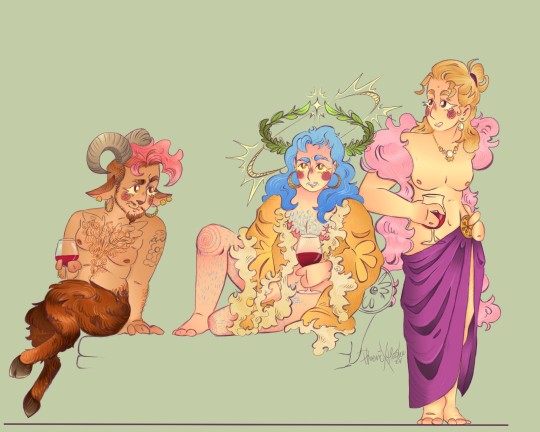
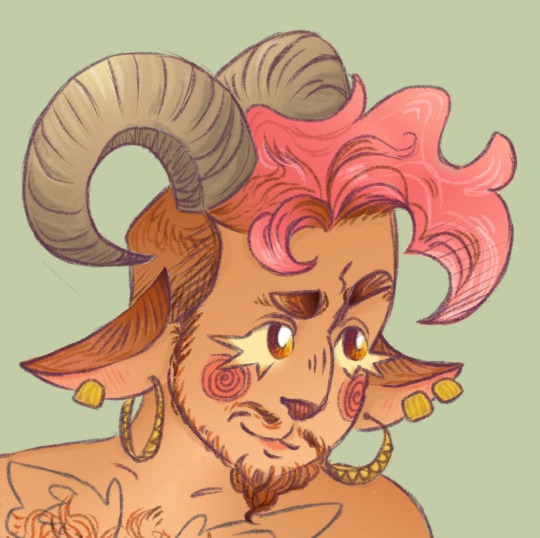
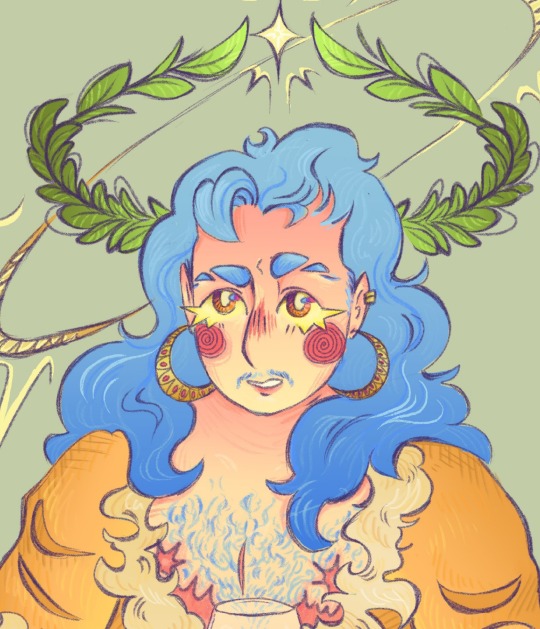
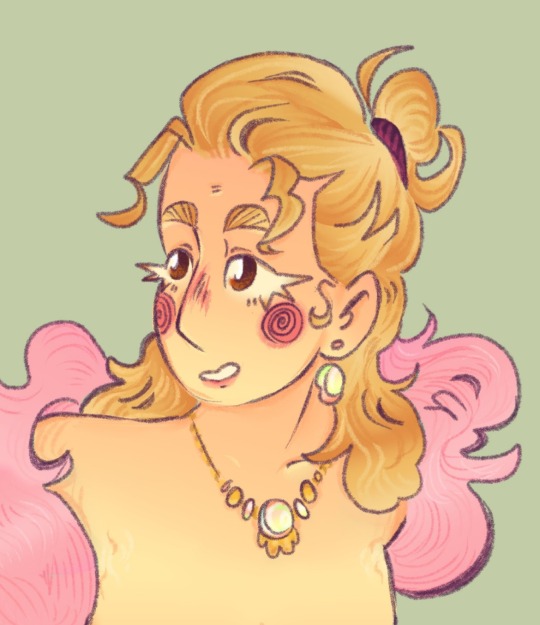
Ariadne and her Lovebugs.
Left to right: Ampelos, Dionysus and Ariadne.
18 notes
·
View notes
Text
So to pass the time lately I played through Lies of P for the first time
And of course, me being me, I proceeded to make everything about the game gay
Tho what started as just "I think Carlo and Romeo are exes" and "Eugenie needs a girlfriend" turned into an actual honest to fuck queer reading after that final boss fight
tl;dr: Lies of P is to trans femmes what original Pinocchio is for trans mascs
but to explain my insanity I'm gonna have to spoil the shit out of the game soooooo you've been warned
Okay so for the sake of simplicity I'm gonna refer to Geppetto's son as Carlo and to the protagonist of the game as P. I know they have literally the same soul, but they don't share memories and don't seem to share a sense of identity, so I'm gonna treat them as different people here
Also it's important for The Symbolism, so bear with me here
So our dear P is this new person who is slowly building a sense of identity for himself, this being represented by you slowly growing more human the more you do certain things in the game
Like enjoying music, and lying to people
You know, normal human stuff
This eventually leads to one of the first big changes in P's character design. P grows his hair out, much to Geppetto's frustration.
Because P no longer looks like Carlo. He's starting to differentiate himself from the person Geppetto expects his son to be.
This tension between P's growing sense of self, and Geppetto's expectation for P to just turn into this image he has of Carlo, just continues to escalate
Culminating on the final boss fight against The Nameless Puppet
Carlo's corpse being used by Geppetto to claim back his son's soul
And that's when the old man says a line that makes me rethink who P and Carlo are
"This freedom isn't for you. It's for Carlo"
and you know, there's something about how to claim your freedom and keep your soul, you have to fight and defeat your own masculine body, which is being puppeteered by your controlling father, who has very strong opinions about who you're supposed to be
ESPECIALLY when said father keeps calling you a male name that is no longer yours
ESPECIALLY ESPECIALLY when the very first thing you do after that is sacrifice yourself so that your soul can be reborn in a feminine body
And like okay maybe this could be interpreted as kinda bad, because the way you unlock this ending is by lying through your teeth repeatedly, so it could kinda imply that P's new identity is a lie
But you gotta remember that nearly every lie she tells are just white lies to help people deal with a miserable fucking situation. And the only lies she tells about herself are all for the sake of self preservation
Like her first lie is her trying to get the security systems of the hotel from killing her
And her last lie is her telling her dad she trusts him
In the end P feels like a transfemme with a very strained relationship to her father, who still only sees her as "Carlo", the son he insists she should be.
Honestly there's probably a lot to be said about P and Carlo's relationship to Romeo, as well as Sophia's role in this story, but I'd need to play through the game again to get all the specific interactions aaaaand I don't feel like playing a video game twice back to back
fucking sue me
Anyways Lies of P is good and very easily read as queer, and you guys should definitely try it
29 notes
·
View notes
Text


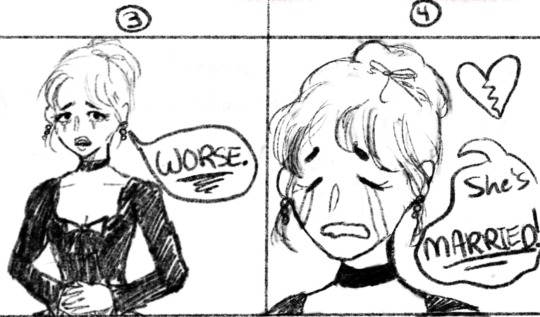
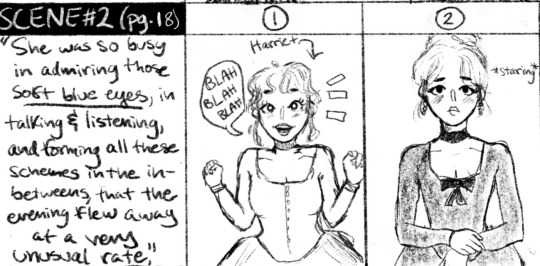

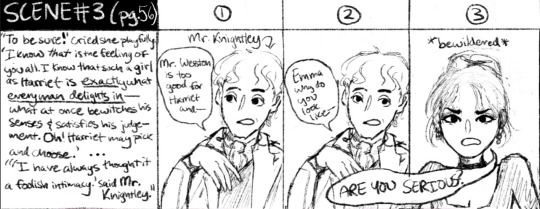
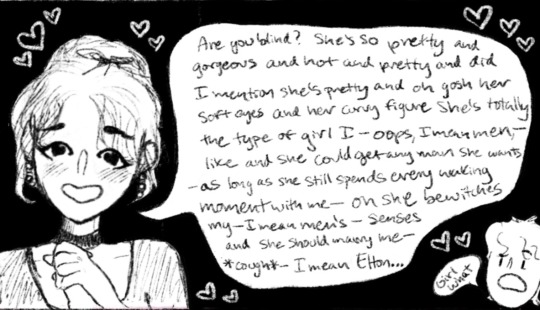
This is for the Queer Austen Truthers! I give you Jane Austen’s “Emma” but as a sapphic YA graphic novel!!
I made this for my queer 18th century British literature class (very liberal arts college of me, I know) and I felt the need to share it!
I took quotes directly from “Emma” that can be read from a queer perspective and I paired them with illustrations that show my personal interpretation of the text.
PSA: This is MY interpretation. I know Emma is “straight” canonically but let me have my fun. If you don’t like queer readings of novels, don’t read! This isn’t for you!
#queer#sapphic#sappho#ya graphic novel#graphic novel#zine#jane austen#Emma#emma woodhouse#queer reading#lets go lesbians#i love lesbians#lesbian#gay
99 notes
·
View notes
Text
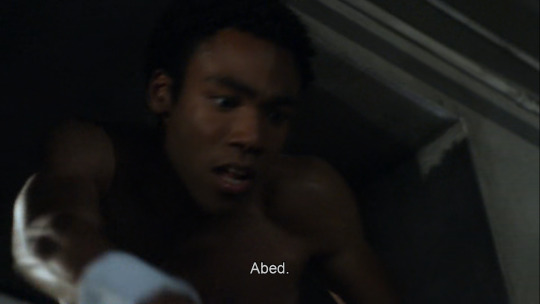
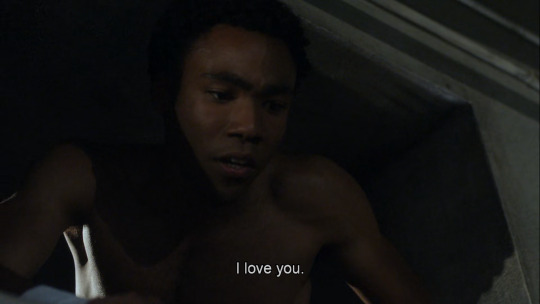
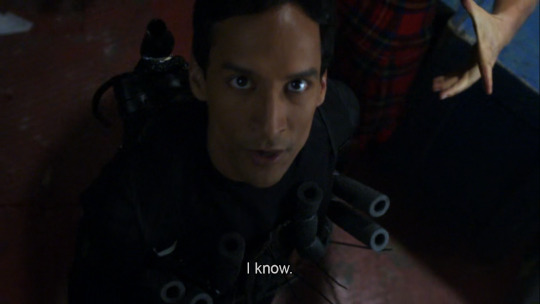
Community Season 2, Episode 6: Epidemiology
Homoerotic undertones
Quotes from the DVD Commentary (I would like to already apologise as english isn't my first language and I couldn't find a script for it, I'm writing what I can understand, if anyone could correct a mishearing I would be most grateful):
Dan Harmon: Donald, and Anthony and Danny, you know, kind of workshoped this scene, [?], rehearsed it, and so...
Donald Glover: It's so cliché that black people get killed [Laughs]
Anthony Hermingway: This is the heart of the episode to me, this is the best part.
Dan Harmon: You guys came up with this, right?
Donald Glover and Anthony Hermingway: Yeah.
[Laughs]
Donald Glover: We just... we did it, we were running through it and it just felt so right to say that. It didn't feel like... and it didn't feel like to push forward it was just "I love you", I thought my friends are gonna die.
#community#abed nadir#troy barnes#homoerotic undertones#queer reading#achillean archives#trobed#Donald Glover#Anthony Hermingway#danny pudi#s2ep6#Epidemiology
80 notes
·
View notes